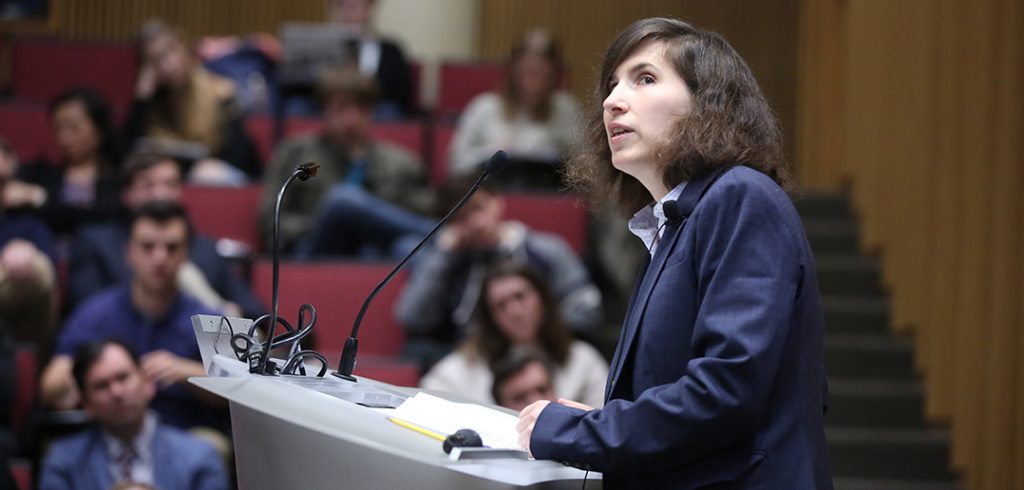Her straightforward, just-the-facts delivery parsed the little told history of an “archipelago” of nation states that helped establish tax havens. They ranged from Monaco in Europe to the Bahamas and Cayman Islands in the Caribbean to Liberia in Africa.
The March 8 talk, titled “Twilight Capitalists: The Global Cold War and the Unmaking of Postwar Capitalism,” was delivered at Fordham’s Lincoln Center campus to kick off a three-day conference hosted by the O’Connell Initiative on Global Capitalism, sponsored by Robert J. O’Connell, FCRH ’65.
In her talk, Ogle described a group of men who she said were part of the political establishment during World War II—members of the diplomatic corps, those with high military ranks, or members of the CIA or the British Intelligence—whose dubious practices contributed to the development of offshore banking.
“After the war, they were out of a job, and most moved smoothly to private business and banking,” she said. “They used their experience abroad to apply themselves to the notion of free enterprise.”
Among them, she said, were “diplomat capitalists,” like Walter H. Diamond, who worked at the Federal Reserve Bank during the war and was responsible for shutting down German and Axis-allied banks. He later became an adviser on tax policy and went on “to become a giant on the best strategies on tax avoidance,” said Ogle. Another, Edward Stettinius, once served as the U.S. Secretary of State under Presidents Roosevelt and Truman; he helped develop the Liberia Company in 1947, a partnership with the Liberian government and American businessmen—thus making Liberia one of the earliest tax havens. And Robert B. Anderson, former Secretary of the Navy and later of the Secretary of Treasury, went on to establish the World Banking Corp. He was eventually sentenced to prison for money laundering and operating an illegal offshore bank.
Ogle also highlighted British ex-spy William Stephenson, former head of the British security in the Western hemisphere. Stephenson, she said, was the model for author Ian Fleming’s James Bond character. Together with Stettinius, he formed the World Commerce Corporation, which was promoted as a way to invest in developing countries, but which Ogle called “a CIA front, of sorts.”
From a bank that had “enough generals, admirals, and spooks to run a small war” to an expert in guerilla warfare who made his fortune from designing a machine gun silencer, Ogle named neo-libertarian institutions and individuals that, upon helping win the war, found ways to funnel tax funds away from those nations they once defended. (She also touched upon former Nazis doing the same practice in Panama, Brazil, and Argentina.)
In closing, Ogle elaborated on the 21st-century consequences to these 20th-century maneuvers. She said the former spies weren’t profoundly patriotic, and they didn’t necessarily reflect upon “how they drained the nation state(s).”
“The greatest damage we see today is the inequality, [and]that can be clearly linked to the fact that it [is]much easier [for individuals]to hide vast amounts of wealth,” she said. “It has had a tremendous effect, and it fuels the perceived problem people have with the way things work.”

